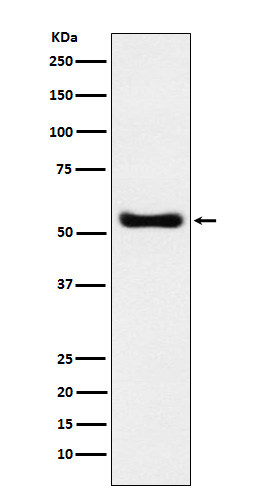KAT8 Rabbit mAb
- 产品详情
- 实验流程
Application
| WB, IHC-P, IF, FC, ICC, IP |
|---|---|
| Primary Accession | Q9H7Z6 |
| Reactivity | Rat, Human, Mouse |
| Host | Rabbit |
| Clonality | Monoclonal Antibody |
| Isotype | IgG |
| Conjugate | Unconjugated |
| Immunogen | A synthesized peptide derived from human KAT8 / MYST1 / MOF |
| Purification | Affinity Chromatography |
| Calculated MW | 52403 Da |
| Gene ID | 84148 |
|---|---|
| Other Names | KAT8 |
| Dilution | WB~~1/500-1/1000 IHC-P~~N/A IF~~1:50~200 FC~~1:10~50 ICC~~N/A IP~~N/A |
| Format | Liquid in 10mM PBS, pH 7.4, 150mM sodium chloride, 0.05% BSA, 0.02% sodium azide and 50% glycerol. |
| Storage | Store at 4°C short term. Aliquot and store at -20°C long term. Avoid freeze/thaw cycles. |
| Name | KAT8 {ECO:0000303|PubMed:33657400, ECO:0000312|HGNC:HGNC:17933} |
|---|---|
| Function | Histone acetyltransferase that catalyzes histone H4 acetylation at 'Lys-5'- and 'Lys-8' (H4K5ac and H4K8ac) or 'Lys-16' (H4K16ac), depending on the context (PubMed:12397079, PubMed:16227571, PubMed:16543150, PubMed:20018852, PubMed:21217699, PubMed:22020126, PubMed:22547026, PubMed:31794431, PubMed:33837287). Catalytic component of the MSL histone acetyltransferase complex, a multiprotein complex that mediates the majority of histone H4 acetylation at 'Lys-16' (H4K16ac), an epigenetic mark that prevents chromatin compaction (PubMed:12397079, PubMed:16227571, PubMed:16543150, PubMed:21217699, PubMed:22020126, PubMed:22547026, PubMed:33657400, PubMed:33837287). H4K16ac constitutes the only acetylation mark intergenerationally transmitted and regulates key biological processes, such as oogenesis, embryonic stem cell pluripotency, hematopoiesis or glucose metabolism (By similarity). The MSL complex is required for chromosome stability and genome integrity by maintaining homeostatic levels of H4K16ac (PubMed:33837287). The MSL complex is also involved in gene dosage by promoting up-regulation of genes expressed by the X chromosome (By similarity). X up-regulation is required to compensate for autosomal biallelic expression (By similarity). The MSL complex also participates in gene dosage compensation by promoting expression of Tsix non-coding RNA (By similarity). As part of the NSL histone acetyltransferase complex, catalyzes histone H4 acetylation at 'Lys-5'- and 'Lys-8' (H4K5ac and H4K8ac) at transcription start sites and promotes transcription initiation (PubMed:20018852, PubMed:22547026, PubMed:33657400). The NSL complex also acts as a regulator of gene expression in mitochondria: KAT8 associates with mitochondrial DNA and controls expression of respiratory genes in an acetyltransferase- dependent mechanism (PubMed:27768893). Also functions as an acetyltransferase for non-histone targets, such as ALKBH5, COX17, IRF3, KDM1A/LSD1, LMNA, PAX7 or TP53/p53 (PubMed:17189187, PubMed:19854137, PubMed:37369679). Acts as an inhibitor of antiviral immunity by acetylating IRF3, preventing IRF3 recruitment to promoters (By similarity). Acts as a regulator of asymmetric division in muscle stem cells by mediating acetylation of PAX7 (By similarity). As part of the NSL complex, acetylates TP53/p53 at 'Lys-120' (PubMed:17189187, PubMed:19854137). Acts as a regulator of epithelial-to-mesenchymal transition as part of the NSL complex by mediating acetylation of KDM1A/LSD1 (PubMed:27292636). The NSL complex is required for nuclear architecture maintenance by mediating acetylation of LMNA (By similarity). Promotes mitochondrial integrity by catalyzing acetylation of COX17 (By similarity). In addition to protein acetyltransferase activity, able to mediate protein propionylation (PubMed:29321206). |
| Cellular Location | Nucleus. Chromosome Mitochondrion. Note=Translocated into the nucleus via its association with importin-alpha-1 (KPNA2) (PubMed:28991411). As part of the NSL complex, associates with the proximal part of promoters and transcription start sites (PubMed:33657400). As part of the MSL complex, associates with gene bodies (By similarity). Also localizes to mitochondria; associates with mitochondrial DNA and regulates mitochondrial gene expression (PubMed:27768893). {ECO:0000250|UniProtKB:Q9D1P2, ECO:0000269|PubMed:27768893, ECO:0000269|PubMed:28991411, ECO:0000269|PubMed:33657400} |
Research Areas
For Research Use Only. Not For Use In Diagnostic Procedures.
Application Protocols
Provided below are standard protocols that you may find useful for product applications.
终于等到您。ABCEPTA(百远生物)抗体产品。
点击下方“我要评价 ”按钮提交您的反馈信息,您的反馈和评价是我们最宝贵的财富之一,
我们将在1-3个工作日内处理您的反馈信息。
如有疑问,联系:0512-88856768 tech-china@abcepta.com.
¥ 1,500.00
Cat# AP77107























 癌症的基本特征包括细胞增殖、血管生成、迁移、凋亡逃避机制和细胞永生等。找到癌症发生过程中这些通路的关键标记物和对应的抗体用于检测至关重要。
癌症的基本特征包括细胞增殖、血管生成、迁移、凋亡逃避机制和细胞永生等。找到癌症发生过程中这些通路的关键标记物和对应的抗体用于检测至关重要。 为您推荐一个泛素化位点预测神器——泛素化分析工具,可以为您的蛋白的泛素化位点作出预测和评分。
为您推荐一个泛素化位点预测神器——泛素化分析工具,可以为您的蛋白的泛素化位点作出预测和评分。 细胞自噬受体图形绘图工具为你的蛋白的细胞受体结合位点作出预测和评分,识别结合到自噬通路中的蛋白是非常重要的,便于让我们理解自噬在正常生理、病理过程中的作用,如发育、细胞分化、神经退化性疾病、压力条件下、感染和癌症。
细胞自噬受体图形绘图工具为你的蛋白的细胞受体结合位点作出预测和评分,识别结合到自噬通路中的蛋白是非常重要的,便于让我们理解自噬在正常生理、病理过程中的作用,如发育、细胞分化、神经退化性疾病、压力条件下、感染和癌症。






